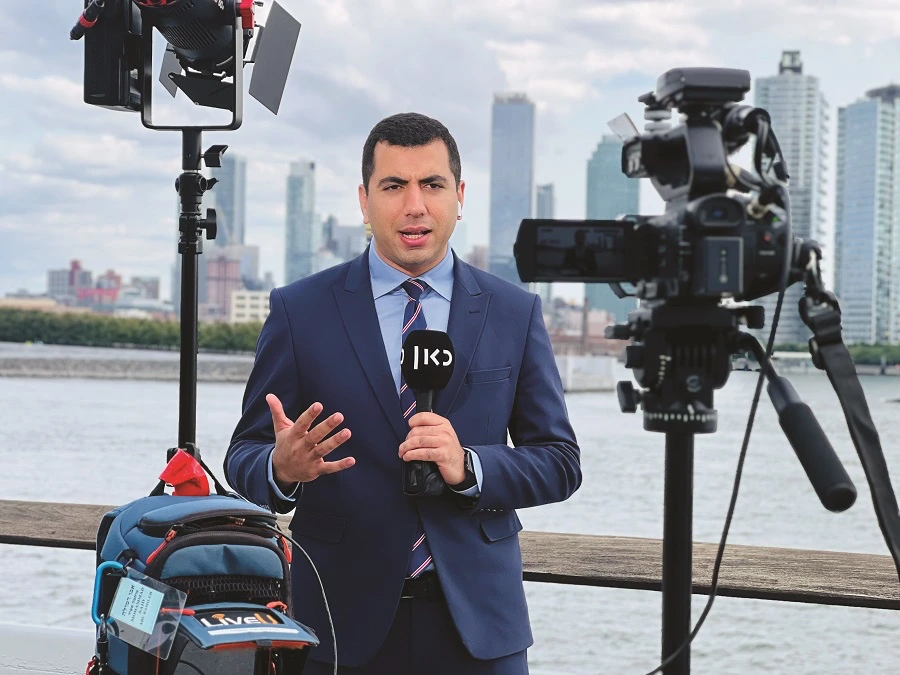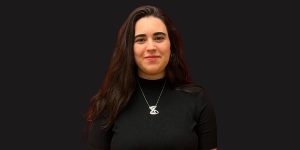No obstacle stopped Suleiman Maswadeh on his way from an East Jerusalem arab neighborhood to the position of the political correspondent for Kan – Israel’s Public Broadcasting Corporation. Not the fact that until the age of 20 he couldn’t put together a single sentence in Hebrew, not the cries of “traitor” and “collaborator” he receives on a daily basis – and not even the death threats he has received.
It’s hard to imagine a more extreme change in the life trajectory of a young man in is twenties. Maswadeh grew up in East Jerusalem to a devout Muslim family (“We made pilgrimage to Mecca three times”), was educated in a religious school (“In my time, Hebrew studies were not popular”), and was completely disconnected from Jewish neighbors in the city (“We lived in a bubble. There was no interaction at all”). The twist that diverted his life path to the front line of Israeli media is even more amazing considering that throughout most of his life – up until merely 8 years ago, when he was 20 – the articulate TV correspondent who provides daily commentaries and reports in fluent Hebrew, knew only a few words in Hebrew. “I only knew the most basic words. ‘Good evening’, ‘Good morning’, a few words here and there”, he recalls. “I couldn’t put together a single complete sentence in Hebrew”.
“anxiety”
The change occurred within a few short years. Maswadeh begins accounting studies at Birzeit University on the outskirts of Ramallah, and completes two years of studies, on the safe path to the coveted degree – accountant. But then he decides on a change of direction, and resolves to transfer to an Israeli academic institution and learn Hebrew.
“Schools in East Jerusalem didn’t teach Hebrew. The path to a Palestinian university was logical”, he recounts about is days in “boring accounting studies”. “To finance my studies, I worked as a waiter at the King David Hotel in Jerusalem. The realization that I was in trouble hit me when I spoke with Arab waiters at the hotel and realized that they were all graduates of Arab universities, without Hebrew and without prospects. I went into anxiety”, he admits. “So I decided to leave my studies and go to work, understanding that studying without knowing Hebrew is worthless”.
After hearing from a coworker at the hotel about opportunities to learn Hebrew and integrate into Israeli academia, he enrolled in an intensive Hebrew study program at Hadassah College, which opened the door for him to study for a bachelor’s degree in politics and communication. “I invested everything in learning Hebrew. For me, it was a lifeline, a survival battle for my life”, he describes, “If I hadn’t learned the language, I would be lost today.”
Between his Hebrew studies and his degree in communication, Maswadeh was accepted to work at the Kan Public Broadcasting Corporation as a radio producer in a student position. From there he advanced to the Arab desk in the news channel and was appointed as the regional correspondent in Jerusalem. Within a short time, he was promoted to the position of correspondent for Arab parties and presenter on the channel, and about a year ago he marked another milestone in his rapid career progression when he was appointed as the political correspondent for Kan News.

“When I was appointed as the political correspondent less than a year ago, I of course didn’t know that I had received the opportunity to cover one of the most dramatic wars in Israel’s history”, he says, “On a professional level, I get to cover one of the most dramatic events in the country’s history. On a personal level, this war has caused a profound change in my perception in every possible area”.
As the channel’s political correspondent, Maswadeh is responsible for covering the political aspect of the war and covers everything that derives from it – from the Prime Minister’s Office and the government, through the Cabinet, to Israel’s foreign relations with countries around the world. “Every day I wake up early for the morning journal on Reshet B and go to sleep in the small hours of the night knowing that something can happen at any moment and that I need to be updated all the time”, he describes his busy routine.
“My goal is to understand what’s happening, what the war means for our future, to report the reality as it is to viewers, sometimes while providing a slightly different perspective from the mainstream – and in the process also learn how this war affects me personally”.
Like everyone else, the events of October 7 affected him personally. But his role in a leading media body, together with his unique background – make everything more intense and much more personal. When asked about reactions at home and from his close environment to his work as a political correspondent in a broadcasting corporation so identified with Israel, he replies that they are very varied. “It ranges from congratulations and great pride to bewilderment of what I’m doing there at all. On one hand, I’m looked at as a role model, an example that everything is possible. But there are also much less congratulatory reactions”. Some of these include extreme reactions, even from childhood friends and neighbors who were once close, including derogatory names like ‘traitor’ and ‘collaborator’.
“There are many such reactions. But I’ve learned not to take it to heart. After all, those who call me a traitor are the same failed people who didn’t succeed, who don’t want to see better lives here. It’s not my job to explain to them the obvious – that there’s a profound difference between working as a journalist and working as a Shin Bet agent”.
Personal Dissonance
He emphasizes that just like in any other society, in Arab society too there’s a very diverse spectrum of people, and the feedback is accordingly. “Just a few weeks ago I was in Jerusalem. An Arab guy approached me, hugged me and said excitedly that he and his entire family watch me and everyone is very proud. On the other hand, when I was covering the riots at Damascus Gate, people shouted at me that it’s a shame I work for an Israeli channel.
“This happens, by the way, in routine, not just during war or military operation – and that’s okay too. I’ve learned that there’s a wide variety of reactions and I’ve also learned to filter out the harsh reactions. But in the end I’m human, and things do seep in and there are things you just can’t filter – like death threats. I’ve received quite a few of those and I still do. My personal dissonance currently ranges between my personal success and how much it negatively affects my family”.
Does it affect your family?
“There’s no doubt it would have been easier for the family if I hadn’t chosen this life path. I didn’t understand it until I saw how deep it goes. In Arab society, people watch a lot of news. They’re interested in every word. Every report I give in Hebrew is translated within an hour into Arabic and runs through all the networks. So my close family – whether it’s my father, uncles, even my grandfather before he passed away – receive reactions all the time”.
I assume that today, because of the war the intensity of the reactions, insults and threats is greater.
“It’s much more intense. The intensity of the work has also intensified. Since October 7 I’ve been more in the front, in a constant cycle of work. You hear me in the morning, see me in the evening, and in between read me on the digital platform. Additionally, the senior political correspondent of the channel, Gili Cohen, went on maternity leave – so a lot more load falls on me and it turns out I’m in the front all the time.
“Since October 7 I feel like I’m running a marathon as if it’s a 100-meter sprint. I’m not stopping for a second and not taking a moment to process it all, because I know I’ll sink into it. So, I make sure to be in constant action”.
What’s the next stage?
“When I started working at the corporation I didn’t know where it would lead me but I knew one thing from day one – I don’t want to be an Arab covering Arabs. That’s not for me. I knew that the moment I feel I’m being destined to be an Arab correspondent – I’ll leave the profession. I looked around and saw that all the Arab correspondents in Israeli media are either a correspondent for Arab affairs or a correspondent for Palestinian affairs or a correspondent for the Arab world – and it frustrated me. Why can’t an Arab be a police correspondent or an environmental correspondent? Someone I greatly admire once told me ‘You need to be a journalist who happens to be Arab, not an Arab who happens to be a journalist’ – that’s a statement that goes with me to this day.
“That’s what really pushes me forward. After all, in the end I’m in this role not because of the money. The salary isn’t that good. It’s hard work, around the clock, 24/7. You talk all day with people, 90% of what they tell you are spins and lies. You discover that the people you’re supposedly in good contact with are lying to you – and it’s disappointing. But what drives me in the end is the knowledge, that when ‘Noga’ or ‘Moshe’ or ‘Ahmad’, open the news and see on the screen the kid from East Jerusalem, who didn’t know Hebrew until a few years ago, asking tough questions the Prime Minister and reporting on the most important things in the country – they’ll see that it’s possible to do things differently. That there’s an opportunity here for every child, no matter where they were born and where they came from”.





